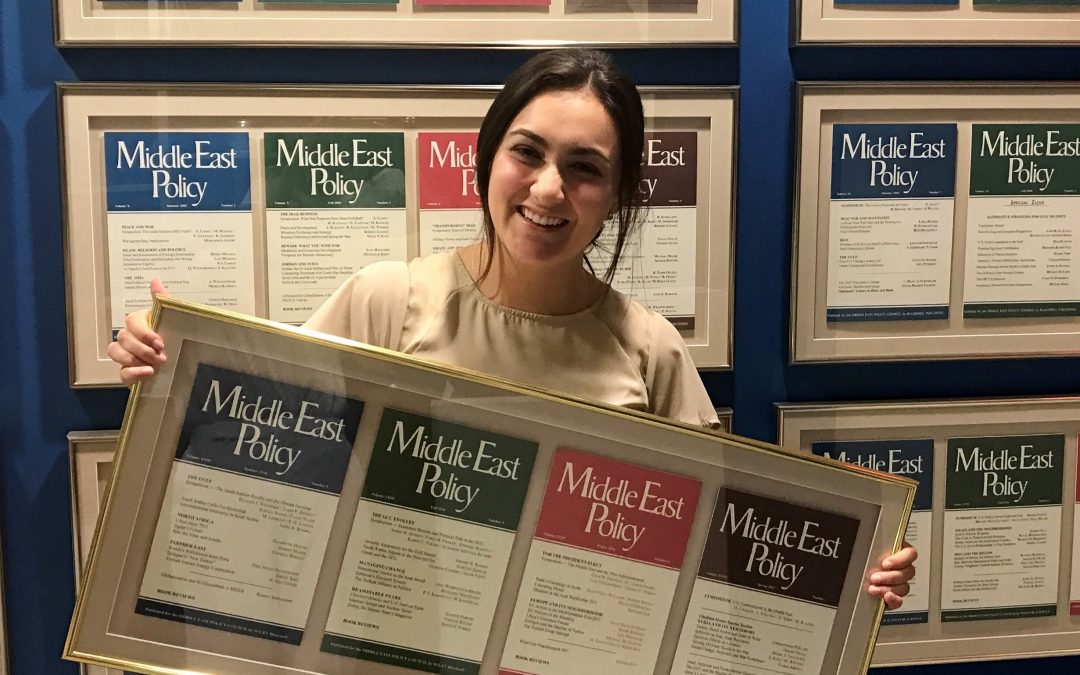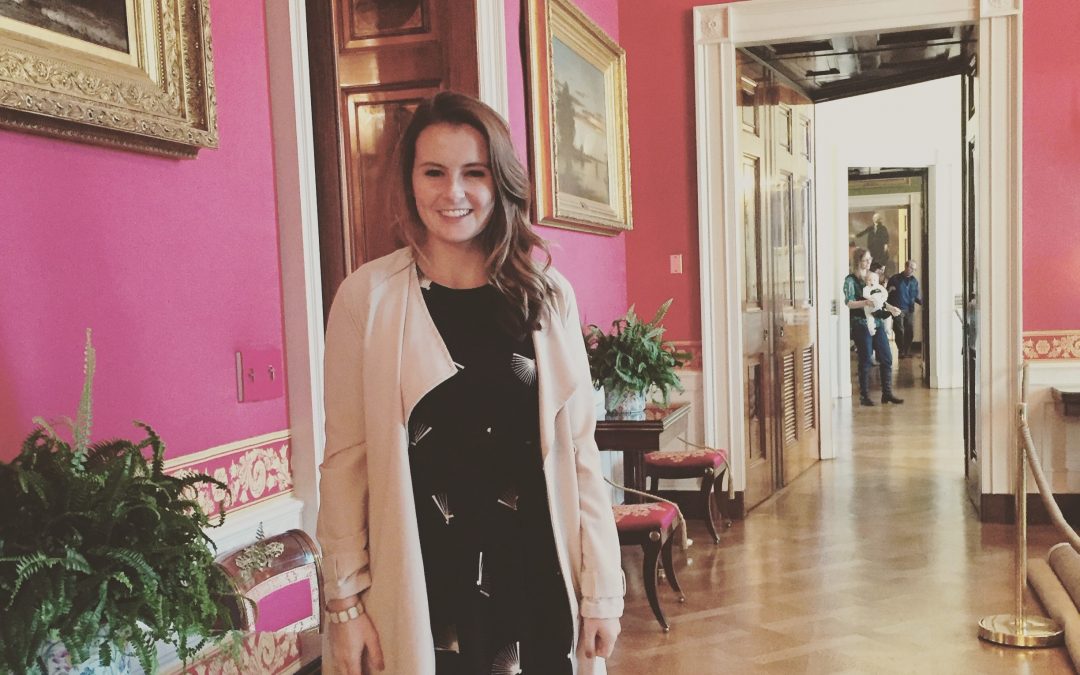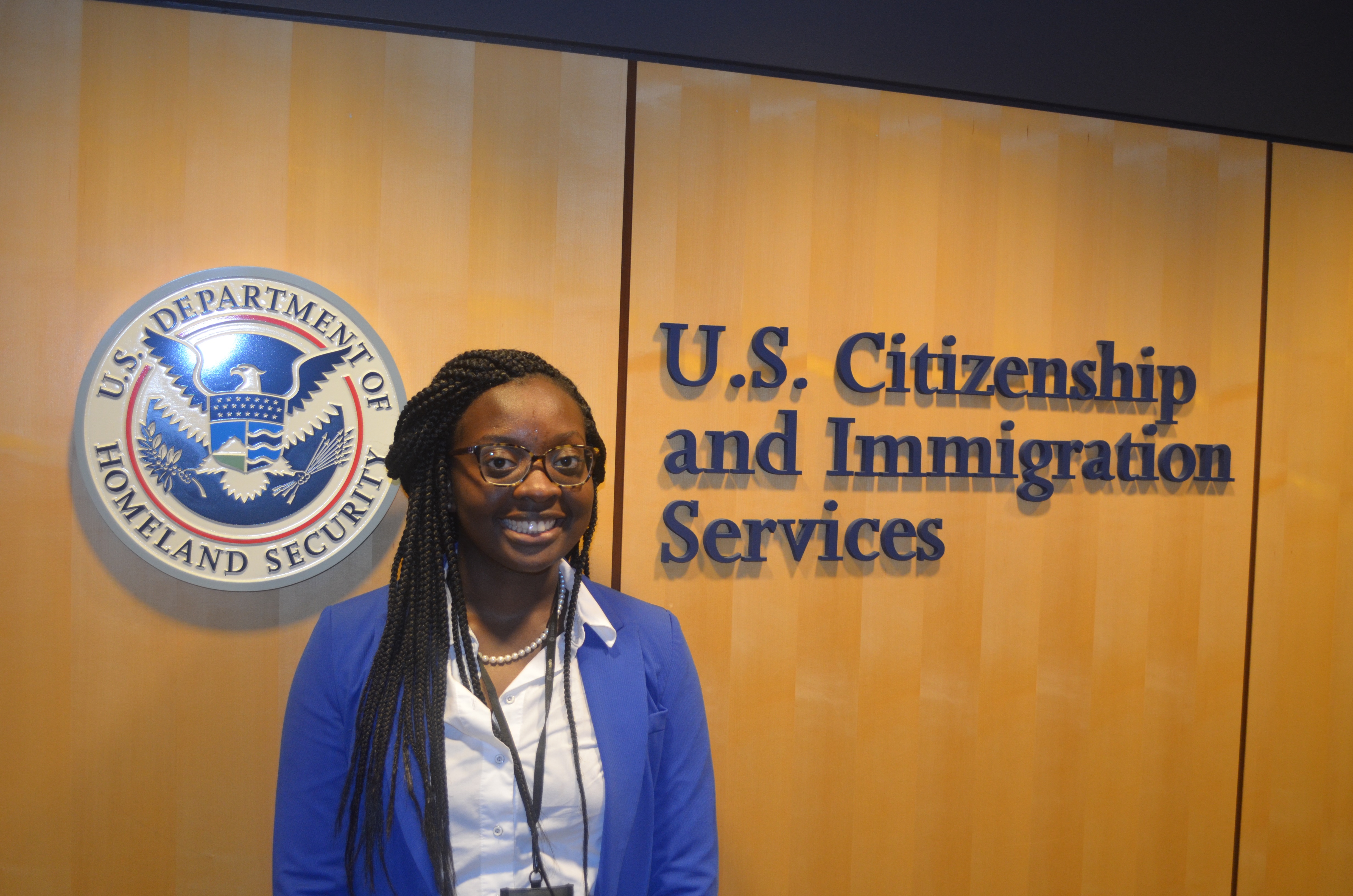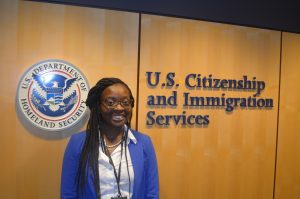
by Madison McHugh | Nov 15, 2017 | Internship Experiences, Undergraduate Students
My name is Gabrielle (Gabi) Hunt, and I’m a rising senior studying Diplomacy, Environmental Studies, and Arabic at Seton Hall. I wanted the organization I interned with this summer to involve work synthesizing all of my interests. Ultimately, I decided on Middle East Policy Council (MEPC) in Washington, D.C., and I could not imagine a better fit.
MEPC is a nonprofit think tank that focuses on education and advocacy work in Middle East issues. It publishes the leading Middle East affairs journal, Middle East Policy (MEP), hosts quarterly Capitol Hill conferences discussing current events, and has an educational outreach branch, TeachMideast, designed to make Middle East issues more accessible to K-12 teachers and students.
I was one of two interns at MEPC who dealt broadly with educational outreach, event coordination, and social media management, along with inputting edits and proofreading articles to be published in MEP. I also wrote a few of my own pieces on current events and completed a 10-week independent project with my fellow intern. For our project, we started a video series aimed at capturing the lives of Arab-Americans around the D.C. metropolitan area. The topics of their interviews typically encompassed how their professions, interests, and passions relate to their cultural identity.
In addition to the larger project, I conducted a series of small projects throughout the weeks – like writing TeachMideast focus pieces – which brought together my interdisciplinary interests. With focus pieces in particular, I was given the opportunity to write about anything I found interesting – from the Saudi Vision 2030 plans to reducing dependency on oil, to the origins of the Boycott, Divestment, and Sanctions movement.
I loved my 10 weeks working at MEPC, especially because I was given so much opportunity to be creative through self-guided projects. Through independent work, I strengthened my professional development and time management skills. I also enjoyed my inclusion in the publication process of MEP, not only because of my interests in writing and editing, but because the responsibility of accurately inputting edits and proofreading fine-tuned my attention to detail and precision. My favorite part about MEPC is that I always felt like a valuable team member whose input was valued.
Overall, I could not be happier with the senior leadership internship experience I had, and the time I was able to spend working in D.C.

by Thomas Ashe | Feb 6, 2017 | Internship Experiences, Undergraduate Students
My name is Courtney Boland. My experience living and working in Washington D.C. was an eye-opening experience. At the United States Agency for International Development (USAID), I participated in projects that extended throughout the world, all with the overarching goal of ending extreme poverty and promoting resilient societies. In the Bureau of Legislative and Public Affairs, I worked with several different departments and witnessed the wide range of agency operations.
Right from the beginning, I dove right in to support the agency’s work at the United Nations General Assembly (UNGA). I worked previously at the UNGA during my time as an intern at the British Consulate General in New York City so I was able to smoothly transition into my new role. Furthermore, when Hurricane Matthews devastated the Caribbean, specifically Haiti, I had the opportunity to see how USAID responded to natural disasters and humanitarian crises. This was a particularly enormous task for the Public Affairs team. All the staff members, including myself, had to ensure accurate information was disseminated out to the public and to USAID’s mission in Haiti as quickly as possible. I gained first-hand experience in the preparation and “war-room “style of operations for disasters.
While all the work I contributed to at USAID has been exciting, the most rewarding was working for First Lady Michelle Obama’s Let Girls Learn initiative. I always admired her global campaign to bring education to 62 million girls who are currently not enrolled in school. The experience to support that mission was certainly very surreal. I tailored my academic studies to gender equality and the importance of female education, which served as key issues of interest for USAID. I assisted in strategic communications for the premiere of The First Lady’s CNN documentary “We Will Rise,” which focused on her trip to Liberia and Morocco where she met with Let Girls Learn beneficiaries. I also visited the White House with my supervisor to meet with our FLOTUS Office counterparts and was even given the opportunity to have a tour of the White House — a D.C. dream come true.
Working for the U.S. government provided me with the opportunity to learn more about the inner-operations of the federal government. Additionally, I witnessed how government agencies prepare for transition from one administration to another. I did not realize how intensive it is and how many people actually leave the agency once President Obama’s administration comes to an end. This is important for me to experience especially if I plan to work in the U.S. government again one day. This experience made it ever more clear to me that I want to continue to work in Washington D.C. following graduation in May.

by Catherine Ruby | Aug 18, 2016 | Graduate Students, Internship Experiences

I am Nina Robinson, a dual degree candidate of the M.A. programs in Diplomacy and Asian Studies. I interned with the Department of Homeland Security: United States Citizenship and Immigration Services (USCIS), specifically with the Office of Privacy. My long-term goal is to become a Foreign Service Officer and to one day serve as a Career Ambassador. Since high school, after studying in China for two consecutive summers, I knew that I wanted to dedicate my life to a career in Diplomacy.
Essentially, my desire to hone my skills and apply the knowledge that I learned in my Diplomacy classes; gain Federal Government experience; and to prepare for a career serving the United States, is what led me to pursue an internship with DHS-USCIS. The Department of Homeland Security was created after the September 11, 2001 terrorist attacks, to safeguard the United States’ border. The agency’s mission is to protect all people, including U.S. citizens, permanent legal residents, immigrants, and non-U.S. citizens. The Department of Homeland Security has offices almost all over the world, which assists those who wish to become citizens and seek asylum due to fear of persecution or danger.
Working with the Department of Homeland Security- United States Citizenship and Immigration Services, introduced me to the many avenues that one may take to establish a federal career focused on international relations. The Office of Privacy, although a small office and often confused with civil liberties or security, plays an important role in the agency. USCIS works to ensure that citizens around the world have the opportunity to become U.S. citizens and provides benefits and services for immigrants. The Office of Privacy works to ensure that the work conducted in USCIS promotes transparency in the government and protects its clients who include non-U.S. citizens and immigrants. The Privacy Act of 1974, which was enacted after the Watergate scandal with then-President Richard Nixon, is the cornerstone of my office. This Act is what helps the Office of Privacy guarantee that information being collected from the people by the government is being protected. Our office ensures that immigrants’ and citizens’ personal information, provided to the Department of Homeland Security and the United States Citizenship and Immigration Services, is being protected, which includes informing clients of what their information is being used for and how it will be used.
In the short period of time I interned here, I have learned a tremendous amount. I have attended four trainings, all which are exclusive to the analysts and officers in the Office of Privacy. As not to go too far into specifics, I have learned about the importance of encrypting PII (Personal Identifiable Information) and various information sharing database sources that the United States and other partner countries use to identify suspected terrorists. Along with training, my office has also provided mentorship, helping me to familiarize myself with various Privacy Act Laws as it relates to the Federal Government and offering career related advice. My life-long dream of becoming an ambassador has not changed. However, Privacy has become a big issue in the world of International Affairs and is a growing field. Students who are looking to put their diplomacy and analytical skills to use may find Privacy an interesting and exciting alternative to the Diplomacy field.




